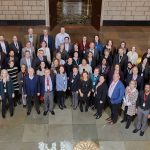This week, we highlight an upcoming webinar exploring preliminary results on the impact of Plan S. We also feature two upcoming conferences: the MAPS EMEA Annual Meeting in May and the OASPA 2024 Conference in September, which is now accepting proposals. We learn about the implementation of a new paper mill detection service at Wiley and about the identification of articles containing the hallmarks of AI-generated content. We also read a review of the current state of publication integrity. Finally, we read an article exploring a new approach to persistent identifiers.
To engage with:
Evidence on the impact of Plan S via OASPA
How has Plan S influenced global scholarly communications and the adoption of open access? In 2023, cOAlition S commissioned a study to answer just that. Join panellists Iryna Kuchma (Open Access Program Manager at EIFL), Ashley Farley (Program Officer of Knowledge and Research Services at the Bill & Melinda Gates Foundation), Pablo de Castro (Open Access Advocacy Librarian at the University of Strathclyde), Wolfgang Benedikt Schmal (Research Group Lead Economic Policy at Walter Eucken Institute) and Emma Wilson (Director of Publishing at the Royal Society of Chemistry) at this virtual seminar to explore the preliminary results of the study. Registration for the seminar is free.
MAPS 2024 EMEA Annual Meeting via The Publication Plan
It’s time to register for the Medical Affairs Professional Society (MAPS) 2024 EMEA Annual Meeting! Taking place in Madrid, Spain from 12 to 14 May, the meeting aims to foster collaboration and enhance the impact of medical affairs across the EMEA (Europe, Middle East and Africa) region. Under the theme From action to impact, the agenda builds on discussion topics planned for the upcoming MAPS Americas meeting.
OASPA 2024 Conference: call for proposals via OASPA
The call for proposals for the Open Access Scholarly Publishing Association (OASPA) 2024 Conference is open! The conference will take place in Lisbon, Portugal from 16 to 18 September. Proposed panels should explore key topics in open scholarship and provide diverse speaker perspectives. The deadline for submissions is 10 April.
To read:
Wiley implements paper mill detection service via Retraction Watch | 3-minute read
As part of its wider commitment to addressing publishing manipulation, Wiley has announced the expansion of a new artificial intelligence (AI)-powered paper mill detection service. The service uses tools, including paper mill similarity detection, problematic phrase recognition and researcher verification, to identify content that may have been compromised. During an internal pilot, the service flagged up to 13% of manuscripts submitted to 270 Wiley titles as potentially originating from paper mills.
AI fingerprints found in Elsevier articles via The Scholarly Kitchen | 6-minute read
Early last week, bibliometric sleuths identified fingerprints of AI-generated content in two articles published in Elsevier journals. In this post, David Crotty (Senior Consultant at Clarke & Esposito) explores how these AI artefacts were identified, questions how widespread the problem is, and considers when and where AI-generated content may have been introduced to these articles.
Publication integrity: a review via Journal of the Royal Society of New Zealand | 35-minute read
Many of our digest features this week have explored challenges related to publication integrity. In this review, the authors discuss the importance of research integrity and share their experiences of engaging with an “inefficient, inconsistent … and incomplete” reporting system. Although tools for assessing publication integrity are available, the authors argue that stakeholders should do more to address the problem.
Achieving truly persistent identifiers via The Scholarly Kitchen | 12-minute read
“A truly persistent identifier should always resolve to the same result”, according to the authors of this article. However, evidence suggests that content drift occurs in over 75% of uniform resource identifier (URI) references linked in scholarly articles. In this post, authors Christopher Hill (Co-founder of DeSci Labs), Philipp Koellinger (Co-founder of DeSci Labs), and Erik Van Winkle (Head of Operations at DeSci Labs) discuss how decentralized persistent identifier technology could realize a future-proof digital scientific record.
Enjoy reading our content? Then make sure to follow us on Twitter/X and LinkedIn for regular updates!






